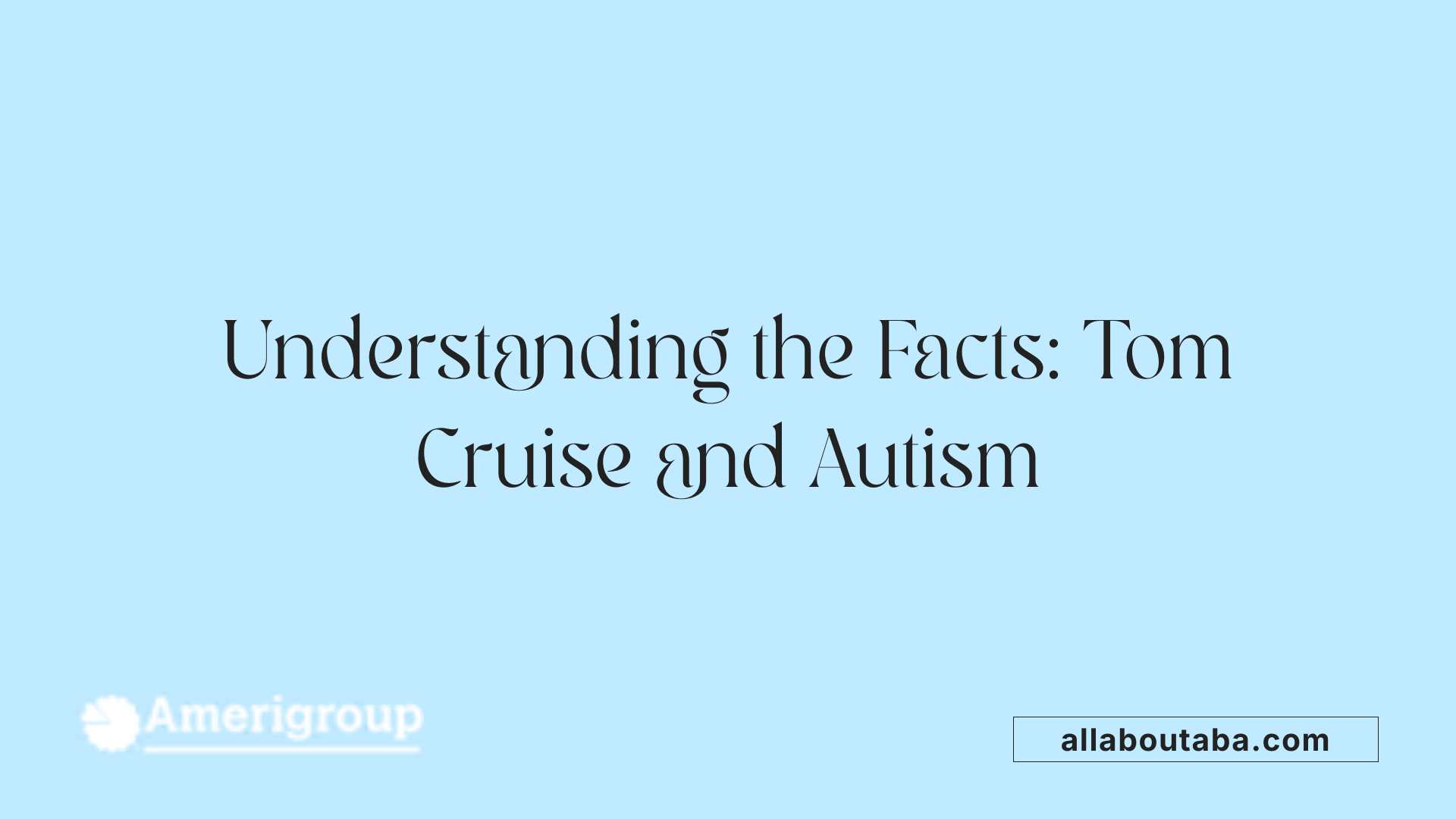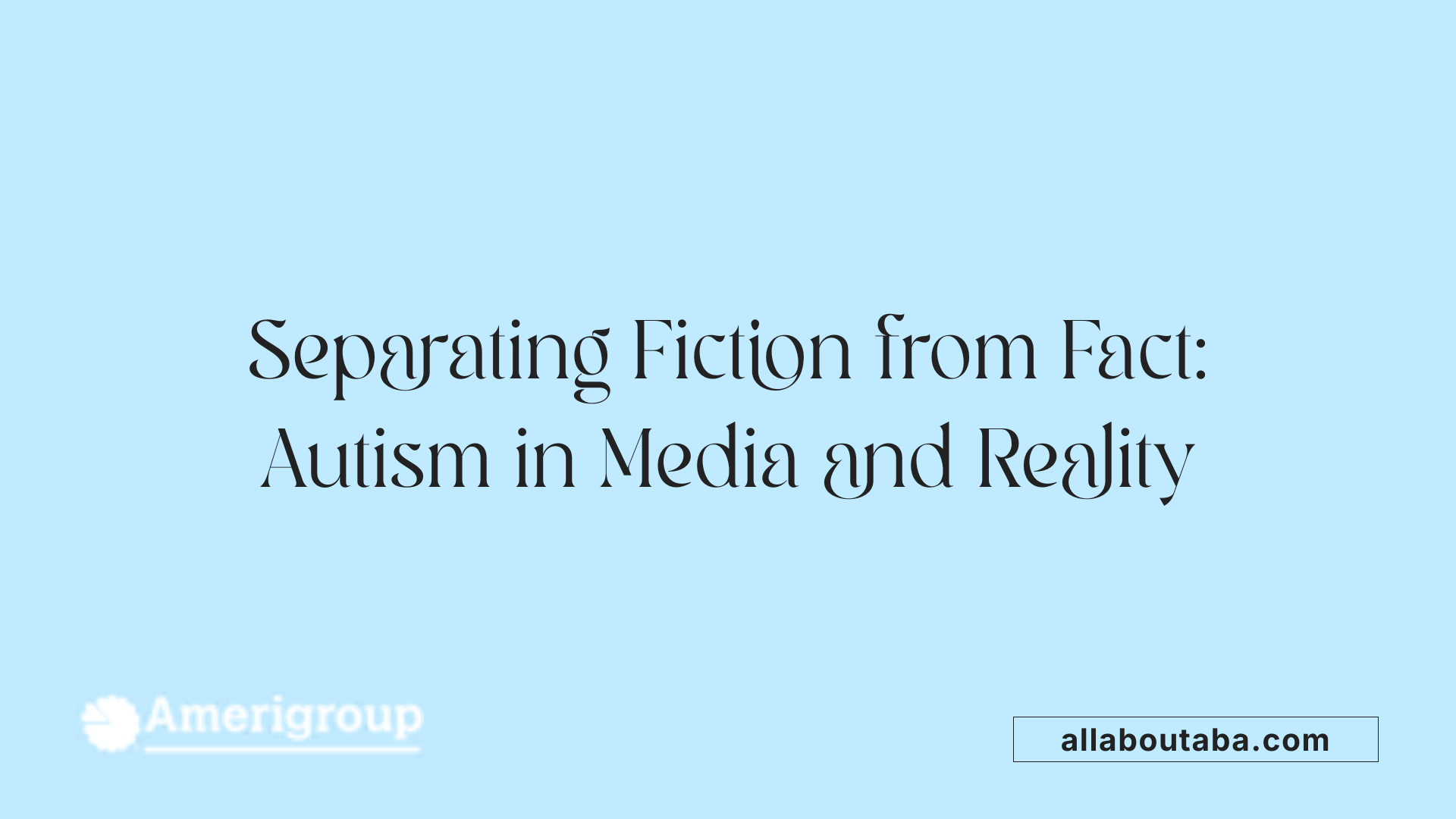Unraveling the Truth Behind the Actor's Health and the Impact of Media Portrayals
Tom Cruise, one of Hollywood's most iconic actors, has often been the subject of speculation regarding his personal health, particularly concerning autism. This curiosity is partly fueled by his role in the film 'Rain Man,' which dramatically raised public awareness about autism and its spectrum. In this article, we explore whether there is any confirmed information about Cruise's neurological health, distinguish between fiction and fact, and analyze how media portrayals influence public perceptions.
The Absence of Confirmed Evidence Regarding Tom Cruise’s Autism

Is there any confirmed information about Tom Cruise being autistic?
There is no publicly confirmed information or diagnosis indicating that Tom Cruise is autistic. Despite his iconic role as Raymond in Rain Man, which depicts an autistic savant, this fictional portrayal does not reflect Cruise’s personal health or neurodevelopmental status.
The film Rain Man is a work of fiction, and while it brought significant awareness to autism, it does not imply that Cruise himself has autism. The character Raymond Babbitt was based on real-life individuals with savant abilities, such as Kim Peek, but this is a creative point rather than a reflection of Cruise's own identity.
Official records, interviews, or disclosures from Cruise or credible medical sources have not confirmed any diagnosis. Autistic spectrum disorder covers a wide range of presentations, and public figures are not obligated to share personal medical details unless they choose to. Currently, there is no reliable evidence to suggest that Tom Cruise falls on the autism spectrum.
The misconception might arise because of his portrayal in the film and its cultural impact. However, relying on fictional characters to infer real-life diagnoses is misleading. Advances in understanding autism have shown that it is a diverse condition, and a character’s traits in a movie do not determine an actor's neurodevelopmental profile.
In conclusion, claims about Cruise’s autism lack credible support. The association with Rain Man is purely related to his role in the film, which continues to influence perceptions but does not confirm anything about his personal life.
Examining Rumors and Speculations
 There are no verified or credible reports suggesting that Tom Cruise has autism. Despite some circulating online and on social media platforms, these claims lack official confirmation from Cruise himself or any qualified medical sources. Much of the misinterpretation arises from the film 'Rain Man,' where Dustin Hoffman played Raymond Babbitt, an autistic savant with extraordinary skills. This portrayal has led to misconceptions, such as believing that all autistic individuals possess similar savant abilities—something that is quite rare, with only about 1 in 10 people on the spectrum exhibiting such exceptional talents.
There are no verified or credible reports suggesting that Tom Cruise has autism. Despite some circulating online and on social media platforms, these claims lack official confirmation from Cruise himself or any qualified medical sources. Much of the misinterpretation arises from the film 'Rain Man,' where Dustin Hoffman played Raymond Babbitt, an autistic savant with extraordinary skills. This portrayal has led to misconceptions, such as believing that all autistic individuals possess similar savant abilities—something that is quite rare, with only about 1 in 10 people on the spectrum exhibiting such exceptional talents.
It's essential to recognize that the depiction of Raymond in 'Rain Man' is a fictional and often stereotypical portrayal. While the film significantly increased public awareness of autism, it also contributed to misconceptions by focusing on extreme and specific cases. Autism itself is a broad spectrum, encompassing a wide range of abilities and challenges. Therefore, any claims about specific individuals, especially celebrities like Tom Cruise, having autism should be viewed with caution, unless verified by credible sources.
In the absence of any official statements from Cruise or his representatives, the rumors about his autism remain unsubstantiated. These stories are often fueled by misinterpretations of the film and its cultural influence rather than factual evidence. As with all personal health information, autism diagnosis is private and should only be publicly discussed if the individual chooses to disclose it.
In conclusion, while online discussions may suggest otherwise, there is no concrete basis for believing Tom Cruise has autism. It is important to separate fictional portrayals from real-life identities and to respect individual privacy regarding medical and psychological conditions.
The Cultural Impact of 'Rain Man' and Its Influence
What is the connection between Tom Cruise and autism in popular media, like the movie Rain Man?
Tom Cruise starred in the 1988 film "Rain Man," where he played Charlie Babbitt, a self-centered businessman who discovers his brother Raymond, played by Dustin Hoffman, is an autistic savant. The film was groundbreaking in bringing autism into the mainstream consciousness.
The character Raymond Babbitt, with his extraordinary memory and numerical skills, was based on real individuals, including savant Kim Peek. Hoffman's portrayal was heavily informed by research and meetings with savants, which helped create a compelling and memorable character.
Despite its cultural significance, the depiction has also been criticized for reinforcing simplified stereotypes. The film emphasizes Raymond's savant abilities, such as memorization and calculation, which are present in only about 1 in 10 autistic people.
While "Rain Man" increased awareness and understanding of autism, it does not fully represent the diversity within the spectrum. Its portrayal reflects the limited knowledge of autism at the time, focusing on an extreme and specific case rather than the broad range of experiences of autistic individuals.
Today, there is a greater emphasis on nuanced portrayals that recognize varied abilities, independence, and challenges faced by autistic people. Nonetheless, "Rain Man" remains influential for its role in shaping public perceptions—both positive and stereotypical—about autism.
How has the film reinforced stereotypes about autism?
The film's emphasis on Raymond's extraordinary memorization and calculation skills has led many to associate autism strictly with savant abilities, which are actually rare. Most autistic individuals do not possess such talents.
It also depicted Raymond as unable to understand or communicate meaningfully, which has contributed to perceptions that autistic people are all socially disconnected or incapable of relationships. In reality, many autistic people are socially engaged, communicate effectively, and have fulfilling relationships.
Furthermore, the stereotype of autism as a severe, institutionalized condition persists in some public perceptions, partially fueled by the film's portrayal. While powerful, these representations have led to misconceptions and simplified views of a complex neurodevelopmental condition.
How accurate was the depiction of Raymond Babbitt and its representation of autism?
The character Raymond was inspired by actual savants like Kim Peek but is not representative of most autistic people. His abilities for memorization, as explained by experts like Temple Grandin, are linked to intense visualization and concentration, which are specific to savants.
However, most autistic individuals do not display such extraordinary talents, and many lead independent, socially active lives. The film's focus on Raymond's superpowers created a narrow view of autism.
Critics and many within the autism community highlight that the portrayal is outdated and stereotypical today's standards. It misses the diversity within autism and the many ways autistic individuals experience and adapt to the world.
Despite these criticisms, "Rain Man" remains a pivotal piece in autism history, highlighting the importance of continued research and more accurate, respectful portrayals.
| Aspect | Description | Additional Info |
|---|---|---|
| Main Actor | Dustin Hoffman | Award-winning performance, studied autistic savants |
| Character | Raymond Babbitt | Autistic savant with photographic memory |
| Inspiration | Kim Peek and others | Based on real individuals, but exaggerated |
| Impact | Increased awareness | Led to more research and funding |
| Criticism | Stereotyping | Reinforced limited views and misconceptions |
| Representation | Not fully accurate | Focused on savant skills, not spectrum diversity |
Understanding the influence of "Rain Man" helps appreciate its historical role while recognizing the need for more inclusive and accurate portrayals of autism in media.
The Influence of Media on Autism Perception

How is autism generally depicted in media, and does this relate to any claims about Tom Cruise?
Media portrayals of autism have changed considerably over the years. Early depictions tended to be stereotypical, often focusing on the most extreme cases or portraying autistic characters with extraordinary abilities, known as savant skills. These portrayals, such as Raymond Babbitt in Rain Man, helped raise awareness but also reinforced misconceptions—most notably, the idea that most autistic people have superpowers.
Since then, there has been a gradual shift toward more nuanced and diverse representations. Today, many shows and films aim to depict a broader spectrum of autism, emphasizing individual strengths and challenges. However, stereotypes still persist, influencing how the public perceives autism.
Research suggests that media depictions can shape attitudes—positive portrayals can foster understanding and acceptance. Yet, they often do not increase factual knowledge about autism's full diversity. One issue is the lack of diversity among characters with autism, who are frequently portrayed as white males from middle-class backgrounds.
Regarding Tom Cruise, there is no credible evidence linking his personal health or acting in Rain Man to stereotypes or claims about autism. His role as Charlie Babbitt helped popularize the film's portrayal of Raymond, but it does not reflect or influence personal health conditions.
In summary, media continues to play a powerful role in shaping perceptions of autism. While progress has been made, the potential for reinforcing stereotypes remains, underscoring the importance of inclusive, accurate storytelling.
Distinguishing Fiction from Reality

What is the connection, if any, between Tom Cruise and autism in relation to the film Rain Man?
Tom Cruise's link to autism is mainly through his role as Charlie Babbitt in the 1988 film "Rain Man." In this movie, he played the brother of Raymond Babbitt, an autistic savant portrayed by Dustin Hoffman. The film showcased Raymond's extraordinary abilities, such as exceptional memory and mathematical skills, which are traits associated with some savants.
The character of Raymond was inspired by real individuals, including Kim Peek, a well-known savant with remarkable memory skills. Hoffman's portrayal involved extensive research, including studying autistic individuals and meeting with savants like Kim Peek to accurately mimic their mannerisms and behaviors.
However, it is crucial to understand that the depiction of Raymond's abilities and behaviors was very stylized and extreme. Most autistic people do not exhibit savant skills, which are rare, occurring in about 1 in 10 individuals with autism. The film's portrayal, while groundbreaking at the time and greatly influential, has contributed to a somewhat stereotypical view of autism, emphasizing exceptional abilities over the broad and varied spectrum.
Tom Cruise's character, Charlie, experiences significant personal growth through his interactions with Raymond. The film highlighted themes of family, acceptance, and understanding but did not aim to provide a comprehensive picture of autism. Instead, it introduced many to the concept but also reinforced some misconceptions.
In summary, Cruise's connection to autism is through his role in "Rain Man," which played a vital part in increasing awareness but also came with limitations in representing the diversity of the autism spectrum.
Public Disclosures and Perceptions

What is the public perception or disclosure regarding Tom Cruise's neurological or developmental health?
There is no public record or credible information indicating that Tom Cruise has any neurological or developmental conditions, including autism. Cruise has not publicly disclosed any details regarding such health issues, and he has not spoken about having a neurological diagnosis.
Public perception generally regards him as a highly successful actor without any confirmed health disclosures of this nature. As a result, any assumptions or claims about his neurological or developmental health remain speculative and unverified.
Overall, the public perception is that Tom Cruise has not publicly disclosed any health conditions related to neurology or development.
The Broader Context of Autism and Media Stereotypes
How is autism generally depicted in media, and does this relate to any claims about Tom Cruise?
Media portrayals of autism have significantly shaped how society perceives autistic individuals. In the past, these depictions often stemmed from stereotypes, such as autistic characters being presented as socially disconnected, with exceptional savant skills, or as having particular behavioral traits. The film Rain Man in 1988 was a pivotal moment, showcasing Raymond as a savant with extraordinary memory and calculation skills. While this portrayal increased awareness, it also contributed to the misconception that most autistic people possess similar superpowers, which is not accurate since only about 1 in 10 autistic individuals are savants.
Over time, there has been a shift toward more nuanced and varied representations of autism in media. Today, creators and advocates push for portrayals that reflect the diversity of experiences across the spectrum. Despite progress, many stereotypical images remain, often influenced by outdated or exaggerated characteristics. This perpetuates myths, like the idea that all autistic people struggle with communication or excel in specific areas.
Regarding Tom Cruise, who played Charlie Babbitt in Rain Man, current evidence suggests no direct link between his personal health or traits and stereotypical portrayals of autism. The emphasis remains on the character Raymond, whose depiction was based on research and meetings with real savants. Critics note that Cruise's portrayal was integral to the film’s impact, but it is not connected to any stereotypes about autism in relation to Cruise himself.
Overall, while media has improved in representing autism's diversity, stereotypes still influence perceptions. Accurate representation not only educates but also fosters greater acceptance and understanding of the full autism spectrum.
Separating Fact from Fiction: What We Know About Tom Cruise and Autism
In summary, there is no verified evidence or credible disclosure suggesting Tom Cruise has autism. His association with autism is exclusively through his role in 'Rain Man,' which, while culturally significant, contributed to stereotypes that do not accurately represent the spectrum. Media portrayals continue to influence public perceptions, often simplifying or exaggerating the realities of autism. It is important to distinguish between fictional characters and individuals’ real health conditions. Respecting privacy and advocating for more accurate, diverse representations of autism remains crucial in fostering understanding and acceptance.
References
- 13 Facts About Rain Man - Larrylambert - Medium
- Tom Cruise, Albert Einstein, Temple Grandin, and Oliver Sacks
- Autism in Entertainment Begins With a Deep Dive into 1988's RAIN ...
- Rain Man at 30: damaging stereotype or 'the best thing that ...
- Rain Man - Wikipedia
- Wrestling with Rain Man in the Aftermath of My Autism Diagnosis
- A look back at the movie Rain Man and how our views of autism ...







